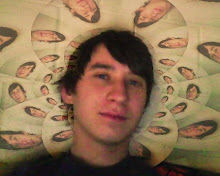The way people are getting their news is drastically changing. The internet, particualry, has impacted journalism and advertising in many unexpected ways.
Before the internet's popularity, people got their news from either newspapers, radio, televison, or magazines. They read the articles and listened to the stories and felt content with just consuming that information and maybe discussing with friends. The main news organizations and advertising corporations controlled all main routes of mass communication with little input from from their readers and consumers.
The Internet has made it possible for those so called "civilians" to play a larger role in the world of news. Which, is frightening for news organizations and advertisers because it has made the market unpredictable. Print specifically is being impacted because more people are going to the Internet, where it is free to read the news and articles.
In the coming future, I believe the readers are going to play an even bigger role in journalism. The prime news orgs. need to realize the Internet has made the public's attention span even shorter. There best chance at keeping their heads above water, is to make the public feel they have control over what topics journalists are talking about. There needs to be a dialogue between journalists and civilians which in turn will allow a better understanding of those civilians. This will be beneficial to advertisers because they can better target potential consumers. Which means profits will be generated so that journalists can continue reporting without worrying about how they can afford their next meal.
Tuesday, February 24, 2009
Wednesday, February 11, 2009
Interview Question for Shirley Raines
--With the upcoming increase in tuition for U of M students, how are you going to insure that the students feel the extra cost is worth it?
Tuesday, February 10, 2009
Critique of Ledes
Hard Lede:
SAN FRANCISCO — Google will announce its entry Tuesday into the small but growing business of “smart grid,” digital technologies that seek to both keep the electrical system on an even keel and reduce electrical energy consumption.
---- I liked this lede primarily because it was short and to the point. It answered all the essential questions.
---- I believe the reporter felt the most important part of the story was that Google was starting up a "smart grid" so users can keep track of their energy concumption.
Link:http://www.nytimes.com/2009/02/10/technology/companies/10grid.html?th&emc=th
Soft Lede:
WASHINGTON -- For many Americans -- those who don't watch cable news or troll political blogs -- Monday night was their first look at the 44th president at work.
---This lede was mediocre. It does not give any clues as to what kind of work Obama was doing. Maybe that was the reporters way of catching the reader's curiousity.
--- The reporter did a poor job letting the reader know what specifically he felt the point of the article was.
Link: http://www.commercialappeal.com/news/2009/feb/10/first-100-days-obama-all-business-in-first-press/
SAN FRANCISCO — Google will announce its entry Tuesday into the small but growing business of “smart grid,” digital technologies that seek to both keep the electrical system on an even keel and reduce electrical energy consumption.
---- I liked this lede primarily because it was short and to the point. It answered all the essential questions.
---- I believe the reporter felt the most important part of the story was that Google was starting up a "smart grid" so users can keep track of their energy concumption.
Link:http://www.nytimes.com/2009/02/10/technology/companies/10grid.html?th&emc=th
Soft Lede:
WASHINGTON -- For many Americans -- those who don't watch cable news or troll political blogs -- Monday night was their first look at the 44th president at work.
---This lede was mediocre. It does not give any clues as to what kind of work Obama was doing. Maybe that was the reporters way of catching the reader's curiousity.
--- The reporter did a poor job letting the reader know what specifically he felt the point of the article was.
Link: http://www.commercialappeal.com/news/2009/feb/10/first-100-days-obama-all-business-in-first-press/
Subscribe to:
Posts (Atom)
